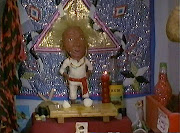 Manny Acta was introduced as Cleveland’s new manager at a press conference with Mark Shapiro on Monday. The conference started off with the usual Shapiro Speak™ before Acta donned the ceremonial press conference jersey and took some questions. Nothing ground breaking of course, but there were a few interesting items to chew on.
Manny Acta was introduced as Cleveland’s new manager at a press conference with Mark Shapiro on Monday. The conference started off with the usual Shapiro Speak™ before Acta donned the ceremonial press conference jersey and took some questions. Nothing ground breaking of course, but there were a few interesting items to chew on.One of the first things I noticed about Acta was how passionate he sounds when talking about baseball and his new team. He’s either one of the best PR men Cleveland has seen in a while, or he really does take tremendous pride in his profession (I’d say a combination of both, particularly the latter). I’m probably over-hyping the man at this point, but even if he is still just drawing from his interview playbook, the fact that he cared enough about joining the team to completely immerse himself in the organization’s structure, players, achievements, and failures from top-to-bottom means a lot. And remember, he chose Cleveland over Houston, an organization he has an amicable history with.
This seems like more than just a second chance to prove himself as a manager, Acta seems like he truly wants to be here and see these players (most of whom he’s probably never even met) succeed and develop. That’s a very cool vibe to get from a manager’s second press conference.
Early on, Acta implied that he at least has a basic understanding of the dynamic behind the fan base in Cleveland, contrasting the 455 straight sellouts of the last Golden Age of Baseball on the North Coast with the absence of a championship. Having spent time in Montreal and Washington, he probably knows it’s going to be an uphill battle to win back the fan base, which is indirectly part of his job. The sooner he can start fielding a contender again, the sooner the fans will (hopefully) start showing the support they used to and rally around the team.
Apparently, Acta had come to respect and know the Indians organization through a few atypical channels. As a NL manager, Acta only had the chance to meet the Tribe on the field once during interleague play in 2007. However, he did become quite familiar with the organization during his time coaching and managing in the minors. As an opposing manager, Acta said he “battled [the Indians] organization for years in the minor leagues.” That was sort of an interesting anecdote for him to bring up now, considering he hasn’t even been in the minors since 2000.
He also described how he watched the Indians on television after he was fired from the Nationals, knowing an opportunity may emerge within the struggling franchise. "[Cleveland] is a place where a lot of people want to be,” said Acta. “In 2007, I worked as an analyst during the playoffs [for FOX Sports en Español (FSE)] and fell in love with the Indians back then."
Acta went on to show his familiarity with the players he’ll be taking on, briefly mentioning how his staff will need to get Carmona back on track in 2010 and how David Huff turned out a successful rookie season (probably not a stretch to pencil Huff into Acta’s starting rotation next year). He even dropped Hector Rondon’s name into the conversation (foreshadowing a mid-season call-up perhaps?).
The main piece of news to come out of the press conference was that some of the coaches Acta is interested in hiring to fill out his staff are still under contract with other teams, meaning he couldn’t discuss any specific names just yet. My take-away from that would be that Acta has been given the lead in assembling his coaching staff, rather than having to work off a pre-determined list of candidates provided by the front office (although obviously Shapiro and Dolan will have to sign off on any final decisions).
The new coaches will probably be announced soon after the World Series, assuming the team is already beginning to contact potential hires.
For the second time, Acta cited Joe Torre as an example of how even the most respected managers in baseball were challenged early in their career. “If you give people the opportunity to choose between, say, Joe Torre after his first three years with the Mets or the Joe Torre now, I believe everyone would pick the one from now," Acta said. "I think we have to look back and know that not everybody who is a big shot now was a big shot when they started. I think big shots are just little shots who keep shooting, and I'm not willing to quit shooting until I become a big shot."
This statement was directed towards the skeptics who have expressed concern over his tenure with the Washington Nationals. Over two and half seasons with the Nationals, Acta compiled a .385 win percentage. Considering what he had to work with in D.C. though, is it really fair to pin those losing seasons on Acta? Below are the first four managerial seasons for three of the league’s current “big shots:”
| Name | Age | Team | Season | Record | W-L% | Finish |
| B. Cox | 37 | Braves | 1978 | 69-93 | .426 | 6 |
| 38 | 1979 | 66-94 | .413 | 6 | ||
| 39 | 1980 | 81-80 | .503 | 4 | ||
| 40 | 1981 | 50-56 | .463 | 5 | ||
| J. Torre | 37 | Mets | 1977 | 49-68 | .419 | 6 |
| 38 | 1978 | 66-96 | .407 | 6 | ||
| 39 | 1979 | 63-99 | .389 | 6 | ||
| 40 | 1980 | 67-95 | .414 | 5 | ||
| T. Francona | 38 | Phillies | 1997 | 68-94 | .420 | 5 |
| 39 | 1998 | 75-87 | .463 | 3 | ||
| 40 | 1999 | 77-85 | .475 | 3 | ||
| 41 | 2000 | 65-97 | .401 | 5 |
This is only a small sample of three successful managers, but I think it gets the point across. With the exception of Bobby Cox in 1980, none of the three compiled a winning season in their first four years on the job. Only Torre lasted longer than four seasons with his first team, leaving the Mets in 1981. Also of note is the fact that all three managers started their careers relatively young and did not field a contending team until after their 40th birthday.
Obviously, I didn’t account for the quality of the teams each manager inherited when hired, which leaves the question of whether bad teams are more inclined to take a chance on a young, rookie manger or if 40-years old and four completed seasons are viable benchmarks in the development of a major league skipper. I may investigate this idea in more detail in the future, but for now, this snapshot seems to highlight a few encouraging trends for the 40-year old Acta’s second tour as manager.
While none of the above managers lasted particularly long with their first team, Acta’s time with Washington was cut especially short. Two and half seasons is nowhere near enough time for a manger to establish his system, develop players, and place his signature upon a team. Acta was fired before he could make any real headway in Washington.
I doubt anybody outside of the Nationals organization expected those teams to come anywhere near a winning record with the players they ran out on the field, it would have been nothing short of a miracle. Combine that with a long list of injuries, instability in the front office, and just a general lack of talented or committed players (remember, they actually traded for Austin Kearns and Felipe Lopez) and the whole situation was a mess. Acta shouldn’t be receiving criticism after the fact for what was just a flat-out, terrible team.
On the other hand, if he failed to hold the attention and respect of his players during his time as manager, that’s certainly cause for concern, but I have yet to hear any reports along those lines. As far as I can tell, Acta tends to be highly regarded and respected by both his players and the rest of the baseball community.
I don’t see this hiring as a gamble for the Indians at all. They seem extremely confident in Acta’s abilities and have a good sense of what to expect from him and I tend to agree with their evaluation thus far. I’m not suggesting Acta is going to vault the Indians back into contention next season, as they’re still in the midst of rebuilding, but I think he’ll surprise a lot of people with his passion, knowledge of the game, and ability to advance the team’s burgeoning young talent.
Quotable Acta
This is by far my favorite quote from Acta that I've discovered. It comes from a June 2008 interview he conducted in Washington with a group of local bloggers (which is pretty cool on its own). The full transcript can be found at Nats320 and provides some additional insight into how he approached certain situations that year. Anyway, here's Manny on base running:
There are 27 outs (in each game) and they are precious. I know that you guys (bloggers) being involved in doing what you do, you do a lot of research and stuff. But the average guy at home still doesn’t go out of his way to understand that just running into outs is not good. You don’t run to run. You don’t bunt to bunt. You run and you bunt when it makes sense. And that’s the way I do things.
Manny-Lantern image courtesy of Mr. Irrelevant









